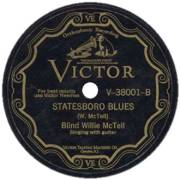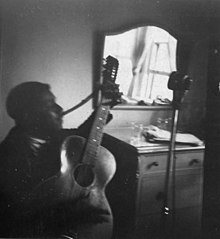|
Blind Willie McTell
Blind Willie McTell (born William Samuel McTier; May 5, 1898 – August 19, 1959) was an American Piedmont blues and ragtime singer, songwriter and guitarist. He played in a fluid, syncopated finger picking guitar style common among many East Coast, Piedmont blues players. Like his Atlanta contemporaries, he came to use twelve-string guitars exclusively. McTell was also adept at slide guitar, unusual among ragtime bluesmen. He sang in a smooth and often laid-back tenor which differed greatly from the harsher voices of many Delta bluesmen such as Charley Patton. He performed in various musical styles including blues, ragtime, religious music, and hokum and recorded more than 120 titles during fourteen recording sessions. He was born William Samuel McTier[1] in the Happy Valley community outside Thomson, Georgia. In his recordings of "Lay Some Flowers on My Grave", "Lord, Send Me an Angel" and "Statesboro Blues", he pronounces his surname MacTell with the stress on the first syllable. He learned to play the guitar in his early teens from his mother and from relatives and neighbors in Statesboro where his family had moved. He was a popular performer on the streets of several Georgia cities, including Augusta and Atlanta where he made his first recordings, eight songs, for Victor Records in 1927 including "Statesboro Blues." .[2] He never had a major hit record but he had a prolific recording career with different labels and under different names in the 1920s and '30s. McTell was active in the 1940s and '50s playing at house rent parties, on street corners, at fish fries, on the medicine and tent show circuit, playing on the streets of Atlanta, often with his longtime friend, Curley Weaver as well as hoboing through the South and East. He made his last recordings in 1956 at an impromptu session recorded by an Atlanta record store owner. He died three years later, having lived for years with diabetes and alcoholism. Despite his lack of commercial success, he was one of the few blues musicians of his generation who continued to actively play and record during the 1940s and '50s. He did not live to see the American folk music revival when many other bluesmen were rediscovered.[3] BiographyMost sources give the date of his birth as 1898 but researchers Bob Eagle and Eric LeBlanc suggest 1903 on the basis of his entry in the 1910 census.[4] McTell was born blind in one eye and lost his remaining vision by late childhood. He attended schools for the blind in Georgia, New York and Michigan and showed proficiency in music from an early age, learning to read and write music in braille,[3] first playing the harmonica and accordion and turning to the six-string guitar in his early teens.[3][1] His family was rich in music; both of his parents and an uncle played the guitar and he and bluesman and gospel pioneer Thomas A. Dorsey were cousins.[1] McTell's father left the family when Willie was young. After his mother died, in the 1920s, he left his hometown and became an itinerant songster. Like Lead Belly, another songster who began his career on the streets, McTell favored the twelve-string guitar whose greater volume made it suitable for outdoor playing. In the years before World War II, McTell traveled and performed widely, recording for several labels under different names: Blind Willie McTell for Victorand Decca, Blind Sammie for Columbia, Georgia Bill for Okeh, Hot Shot Willie for Victor, Blind Willie for Vocalion and Bluebird, Barrelhouse Sammie for Atlantic, and Pig & Whistle Red for Regal Records.[5] The name "Pig & Whistle" was a reference to a chain of barbecue restaurants in Atlanta;[6] McTell often played for tips in the parking lot of a Pig 'n Whistle restaurant. He also played behind a nearby building that later became Ray Lee's Blue Lantern Lounge. McTell married Ruth Kate Williams,[3] now better known as Kate McTell, in 1934. She accompanied him on stage and on several recordings before becoming a nurse in 1939. For most of their marriage, from 1942 until his death, they lived apart, she in Fort Gordon, near Augusta, and he working around Atlanta. In 1940, John Lomax, a Classics professor at the University of Texas at Austin and his wife, Ruby Terrill Lomax, interviewed and recorded McTell for the Archive of American Folk Song of the Library of Congress in a two-hour session held in their hotel room in Atlanta.[7] These recordings captured McTell's distinctive musical style which bridges the gap between the country blues of the early part of the 20th century and the more conventionally melodious, ragtime-influenced East Coast, Piedmont blues sound. The Lomaxes also elicited from him traditional songs (such as "The Boll Weevil" and "John Henry") and spirituals (such as "Amazing Grace"),[8] which were not part of his usual repertoire. In the interview, John Lomax is heard asking if McTell knows any "complaining" songs (an earlier term for protest songs), to which he replies somewhat uncomfortably and evasively that he does not. The Library of Congress paid McTell $10, the equivalent of $154.56 in 2011, for this two-hour session.[2] The material from this 1940 session was issued in 1960 as an LP and later as a CD under the somewhat misleading title The Complete Library of Congress Recordings notwithstanding the fact that it omitted some of Lomax's interactions showing kindness to him and entirely omitting the contributions of Ruby Terrill Lomax.[note 1] Ahmet Ertegun visited Atlanta in 1949 in search of blues artists for this new Atlantic Records label and after finding McTell playing on the street, arranged a recording session. Some of the songs were released on 78 rpm discs but sold poorly. The complete session was released in 1972 as Atlanta Twelve-String. McTell recorded for Regal Records in 1949 but these recordings also met with less commercial success than his previous works. He continued to perform around Atlanta but his career was cut short by ill health, mostly due to diabetes and alcoholism. In 1956, an Atlanta record store owner, Edward Rhodes, discovered McTell playing in the street for quarters and enticed him into his store with a bottle of bourbon where he captured 13 songs on a tape recorder which Prestige Records/Bluesville Records posthumously released as his Last Session.[10] From 1957 to 1959, McTell was a preacher at Mt. Zion Baptist Church in Atlanta.[3] Blind Willie McTell died of a stroke in Milledgeville, Georgia, in 1959, at the age of 61. He was buried at Jones Grove Church, near Thomson, Georgia, his birthplace. Author David Fulmer, who in 1992 was working on Blind Willie's Blues, a documentary about McTell, arranged to have a blue marble gravestone erected on his resting place.[11] He was inducted into the Blues Foundation's Blues Hall of Fame in 1981[12] and the Georgia Music Hall of Fame in 1990.[3] Influence McTell's influence extended over a wide variety of artists. His most famous song, "Statesboro Blues" was adapted by Taj Mahal with Jesse Ed Davis on slide guitar, then covered and frequently performed by the Allman Brothers Band.[13] It also shows up on Canned Heat's "Goin' Up the Country" album. A short list of some of the artists who have performed the song includes David Bromberg, Dave Van Ronk, The Devil Makes Three, Chris Smither and Ralph McTell, who changed his name because he liked the song.[14] Ry Cooder covered McTell's "Married Man's a Fool" on his 1973 album, Paradise and Lunch. Jack White, of the White Stripes, considers McTell an influence; the White Stripes album De Stijl (2000) is dedicated to him and features a cover of his song "Southern Can Is Mine". The White Stripes also covered McTell's "Lord, Send Me an Angel", releasing it as a single in 2000. In 2013, Jack White's Third Man Records teamed up with Document Records to issue The Complete Recorded Works in Chronological Order of Charley Patton, Blind Willie McTell and the Mississippi Sheiks. Bob Dylan paid tribute to McTell on at least four occasions. In his 1965 song "Highway 61 Revisited", the second verse begins, "Georgia Sam, he had a bloody nose", an allusion to one of McTell's many recording names (Note: there is no evidence that he used this name on any recordings). Dylan's song "Blind Willie McTell" was recorded in 1983 and released in 1991 on The Bootleg Series Volumes 1-3. Dylan also recorded covers of McTell's "Broke Down Engine" and "Delia" on his 1993 album, World Gone Wrong;[note 2] Dylan's song "Po' Boy", on the album Love and Theft (2001), contains the lyric "had to go to Florida dodging them Georgia laws", which comes from McTell's "Kill It Kid".[16] The Bath-based band Kill It Kid is named after the song of the same title.[17] A billiards bar and concert venue in Statesboro, Georgia, was named Blind Willie's in the 1990s. The venue is now closed but remains a fond memory for Georgia Southern University students at the time.[18] Another Blind Willie's bar in the Virginia-Highlands neighborhood of Atlanta named after McTell that features blues musicians and bands.[19] The Blind Willie McTell Blues Festival is held annually in Thomson, Georgia.[19] Discography
Singles
Long-plays
Selected compilations
Selected compilations with other artists
FootnotesNotes
3. In 1996, the novelist and former music journalist David Fulmer released Blind Willie's Blues, a 53-minute documentary about McTell’s life, times, and music. The film was remastered for a new release in December 2023 and is currently streaming on YouTube.[20] Citations
Works cited
General references
External links
|
||||||||||||||||||||||||||||||||||||||||||||||||||||||||||||||||||||||||||||||||||||||||||||||||||||||||||||||||||||||||||||||||||||||||||||||||||||||||||||||||||||||||||||||||||||||||||||||||||||||||||||||||||||||||||||||||||||||||||||
